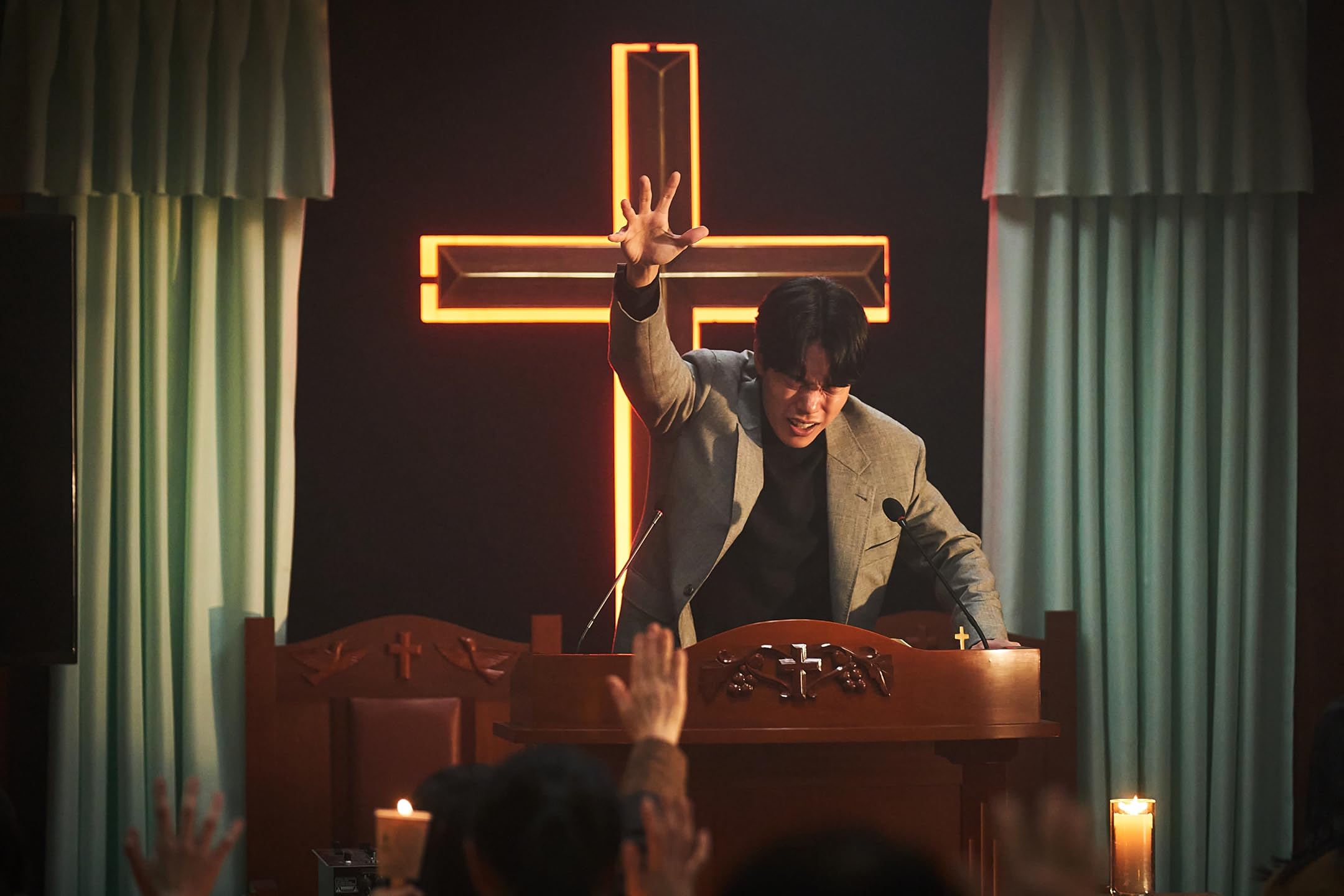As the world goes insane, holding onto faith can offer a moral compass, a fragile north star in a collapsing sky. It keeps us sane because it provides answers to the madness, a framework for suffering, and a promise that pain has meaning.
But Revelations, the new South Korean thriller from Yeon Sang-ho, is a reminder that blindly following someone/something or even “God” himself, is a dangerous act. In the absence of clarity, belief can easily become a weapon. And in Yeon’s bleak vision of vengeance and virtue, it often does.
The film follows a disgraced priest (Ryu Jun-yeol) and a skeptical detective (Shin Hyun-bin) as they unravel a string of killings linked to divine judgment, or at least the belief in it. The premise is potent: what happens when spiritual conviction becomes indistinguishable from moral decay? But while the setup suggests a psychological and philosophical tightrope, Yeon’s film stumbles into abstraction rather than walking it.
Revelations is streaming now on Netflix.
Where faith begins and sanity ends
Revelations wants to be more than a procedural. It wants to be a parable. But where parables offer clarity, Yeon offers ambiguity. Each character is cloaked in trauma, each act of violence wrapped in biblical reference. Yet instead of peeling back layers to reveal something real, the film doubles down on mystique.
Still, it asks a necessary question: If faith anchors us, what happens when the rope snaps?
Psychologist Julian Baggini writes that believing in free will fosters a sense of moral responsibility and purpose. It’s what keeps us accountable—not just to society, but to ourselves. In a godless moment, the freedom to choose is sacred. But in Revelations, that same freedom is weaponized by characters who are convinced they are not choosing at all—that God has already chosen for them.
It’s a terrifying inversion. And it lands hardest in the film’s more unsettling scenes, like when a character describes murder as “cleansing,” eyes blank but voice trembling with divine certainty. These moments nod toward incongruent affect, a psychological phenomenon where emotional expression doesn’t match internal experience. It’s a clinical term, but in Revelations, it reads like spiritual possession. Or psychosis.
The faithful and the fractured
There are two kinds of believers in this film. Those who seek God to survive—and those who use God to justify destruction. The distinction matters. Ryu Jun-yeol’s priest begins as a man clinging to meaning. But the more he searches for divine intent, the more unmoored he becomes. The more answers he demands from the heavens, the more deafening their silence.
This silence—of God, of moral clarity, of narrative closure—is central to Yeon’s approach. The film doesn’t care if you’re satisfied. It doesn’t explain whether the visions are holy or hallucinatory. And in that space, we’re forced to confront an ugly possibility: maybe God did give us free will. Maybe He even gave us mental illness. And maybe He’s watching to see which one we blame.
Yet for all this thematic heft, the film falters in execution. It’s visually arresting, yes—all shadowed corridors and stained glass soaked in menace—but narratively, it drifts. The pacing lags. The tension never truly crescendos. It is a pretty disappointing thriller. Sadly.
When ambiguity isn’t enough
There’s a difference between complexity and vagueness. Revelations confuses the two.
Instead of exploring the psychological cost of belief or the societal rot behind vigilante justice, it lets the weight of its own symbolism drag it down. The characters don’t transform; they deteriorate. And by the time the credits roll, we haven’t watched an arc—we’ve watched a slow collapse.
Still, the film lingers. Not because of what it says, but because of what it refuses to. It refuses to draw the line between martyr and murderer. Between madness and mysticism. Between punishment and penance.
And maybe that refusal is the true horror of the film. That in a world gone insane, even faith—our last refuge—can’t save us. Not because it’s powerless, but because we are too human to wield it responsibly.
Final judgment
Revelations aims for the sacred but lands in the profane. It’s ambitious, atmospheric, and thematically rich—but narratively, it’s foggy, static, and emotionally distant. It gestures toward meaning without ever fully grasping it.
Still, it’s worth watching. Not because it offers answers, but because it mirrors our search for them. In a time where faith is exploited as easily as it’s embraced, Revelations reminds us that belief is not a shield. It’s a mirror. And sometimes, what we see in it is not divine light—but the darkness we brought with us.
We were promised revelations. What we got was silence. And in that silence, maybe, is the real truth.

Leave a Reply